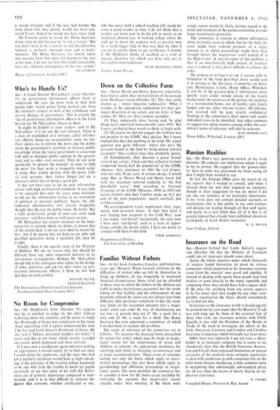Down on the Collective Farm SIR,—Messrs Wood and Henry, however
reluctantly, have had to admit their mistranslation of the passage
from Mozhaev's novel (October 21). This they airily
dismiss as 'minor linguistic technicality.' What, I wonder, is the appropriate euphemism for their per- sistent distortion of my article and my letter of Sep- tember 30? Here are three random examples:
(I) They indignantly deny having said 'be glad things have improved immeasurably since 1956.' But I never attributed these words to them, to begin with.
(2) 'Of course we did not suggest the kolkhoz was not peculiar to the USSR,' they declare. But I never implied that they did anything of the kind. My actual question was quite different: where else were the peasants bound to the land by being denied internal passports? This cardinal issue they prudently ignore.
(3) Triumphantly, they discover a grave factual error in my article: I had said that collective farmers comprised 'nearly half the population' of the USSR, whereas—they announce—in 1961 the real propor- tion was only 28 per cent. A serious charge, it would seem. But, as Messrs Wood and Henry know full well, my statement referred explicitly to 'the first post-Stalin years.' And according to National Economy of the USSR (Moscow, 1956) in 1955 col- lective farmers and their families made up 41.2 per cent of the total population: ,nearly one-half, just as I have stated.
My correspondents freely supplement their 'argu- ments' with personal abuse: in their first letter I was 'forging new weapons in the Cold War,' now 1 am simply 'anti-Soviet' (incidentally, the only time
have seen 'anti-Soviet' used as a term of oppro- brium outside the Soviet orbit). I have no desire to compete with them in this field.
TIBOR SZAMUELY
Department of Politics, The University of Reading


































 Previous page
Previous page